So, around about two years ago, I set up Plus Your Business, having had Plus Your Life in existence for about 6 months before, and that’s the first time that I had run communities online.
So Plus Your Life launched, I think January 2013. When Plus Your Business launched, I had already had experience every day working for the community. And we had live events and a tremendous amount of personal development type work.
When PYB launched, there wasn’t a business model. And for my whole time on Google+, I said, we’ll monetize when we’re ready. And I wasn’t ready until around 2 years and 3-4 months after I’d started Google+. And I think by this point, everybody just thought I was crazy and couldn’t understand what I was doing.
Now, I could see from within my first few days on Google+ that there was something different going on. The world was connecting. The world was becoming more transparent, more open, and people were available. You could build relationships using this technology.
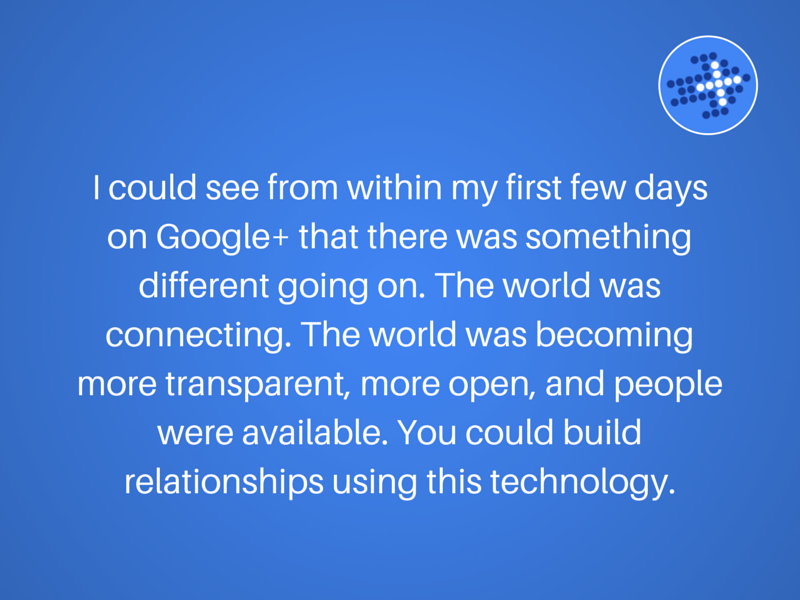
And I think the role of community hit me very, very quickly. And sometimes the people move around the community. It’s not necessarily fixed. People move in and out the same as they would within a real-world area.
But what I found over the last 3 years is there’s an emergent business model which is about the community benefitting and becoming the fabric of the business. And this is what I would call a community-based business. And the way we are structured is that when – so here’s the view.
I can’t do it all on my own. I don’t want to do the delivery all on my own. What I want to do is help people become authorities in their niche. That’s really the product that we sell. And I believe that every community-based business will have some product. And to get to that point, people have to do the work.
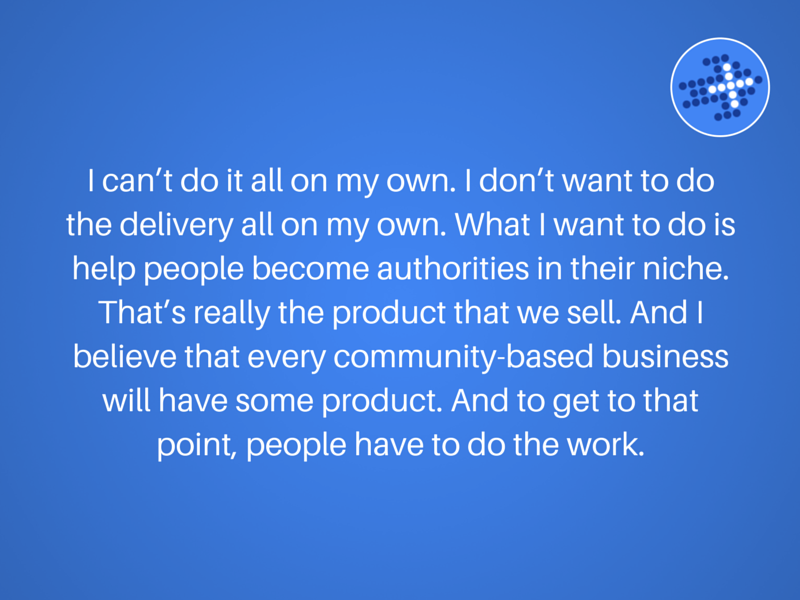
Now when somebody is an authority, their content, their blog content, their videos will surface in Google Search and therefore display their authority. That’s really how authority is displayed now. So with PYB, we are working towards that when people blog on the site, which is already building up Google authority in its own right, but when members blog on the site and people then take an action on the site, they purchase something from the site, they become a paid member of PYB, then they should benefit financially from that.
And when we support each other, it shares our authority, it helps to basically increase, it raises everybody up. So thinking of it this way. Somebody blogs, we amplify that content, that content surfaces in Google search. People click, because it answers a question, solves a problem, it’s of interest to them. They then go through to PYB.com, to that person’s blog post. Then there’s a call to action which is appropriate for that person who’s then viewing it.
Within that call to action button is a code and a referral tracking code that allows us to see who the person came from. And it allows us to attribute that this person purchased the pro membership that we have as the main product because of that person’s influence, the blogger’s influence.
And what then happens is that person then enters the community as a paid member and is served. And I believe that there’s two steps. One of which is people being paid for their authority for actually delivering somebody who then purchases. And the other aspect is then the person needs to be served, looked after, and connected with whoever is most important for them.
Again, that will raise the individuals’ authority as they come in. And why is authority important? Because authority surfaces content in search. You have a visitor to your website when you’re blogging on your own website and content creation on, for instance, YouTube, people clicking in annotation, and then visiting your site from there.
So this is a mini-ecosystem, which is the community-based principle that we’re working on that enables everybody to benefit. You have the blogger that benefits, and you also have the person who then delivers and supports them in the community, because not everybody is necessarily going to find it easy to become an authority.
This is our business model. And in order to make this work, we use Google technology. We use Google hangouts, Google hangouts on air. Google communities are for supporting people at certain levels within our accounting structure. We use Google Drive for content curation or for working on projects together, for collaborative working.
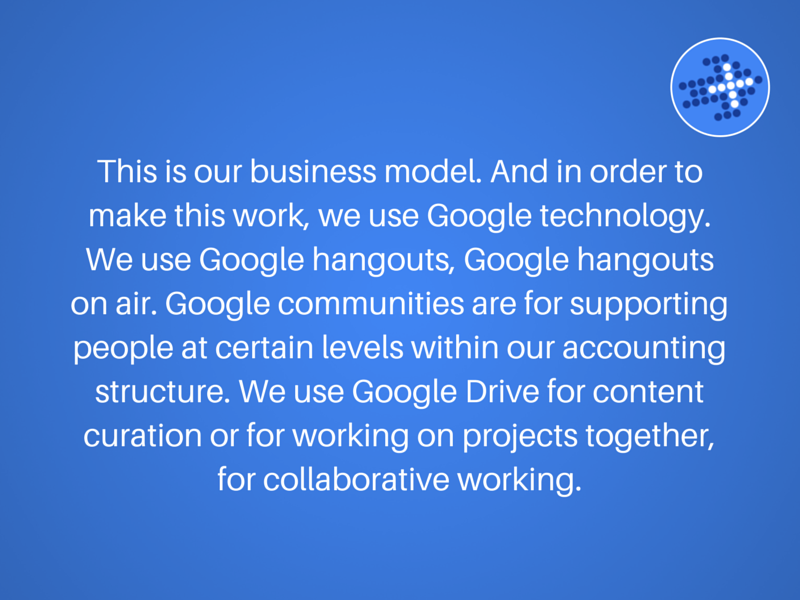
And we use, obviously there’s Google Search, which is a huge part of it as the content gets amplified. And there’s hangouts on air. We use YouTube. So all of the bits of the ecosystem come together. And in fact, the hangout chats, we have little bits of people that come together, and we can support each other. And this is the point. The community has to support itself, but we need a business model to make that work.
Now I believe as a community-based business, we are doing something different. And it’s not always easy. Because we have to fail and fail quickly and succeed longer term. But where we are now is with, hopefully an inspiring story for people that a group of people have come together and I believe that we probably have 100 active members that are supporting each other in this way and supporting the community to succeed.
I believe that this is what is going to happen increasingly. As the technology becomes invisible, as people just get used to it, they can come together and collaborate. And because it’s Google, because they’ve got the search engine attached, they are, if they’re within a parameter of each other, they are able to share that authority. That authority then supports the content that people put out arising in search.
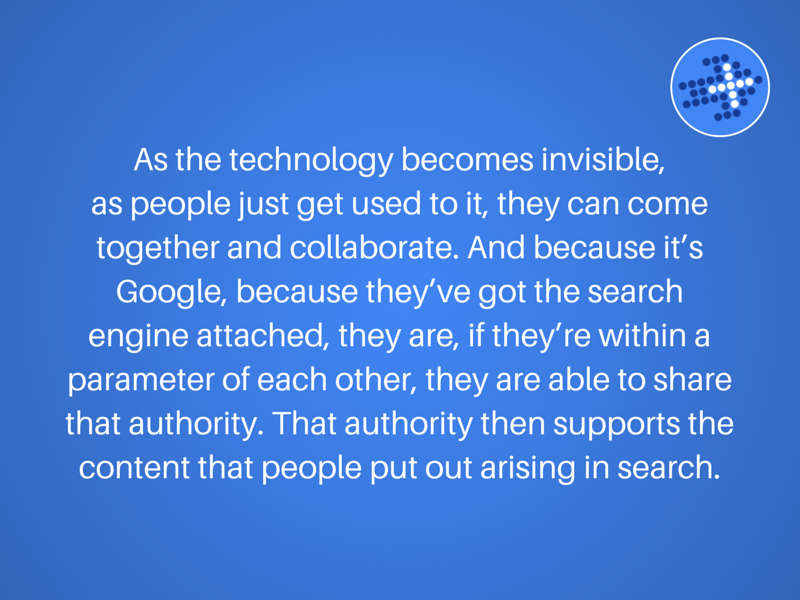
And what we’re doing within PYB is building the most authoritative network on the planet. And we have 5 levels. And at level 5, people are getting solid, first page results incognito for particular search terms. So we have different members, David Amerland is the world authority in Google Semantic Search. I’m getting the first page results for collaborative working as well as many Google+ results. Brian Honegman has marketing consultant on the first page. And we have Sue Zimmerman who is the Instagram marketing expert.. Anna Bennett who is the Pinterest consultant expert.
And right across the board, this is what we’re doing. We’re coming together and saying, who are the most authoritative people, and how can we help each other, and how can we help all the members? And the systems that we’re using, we use other systems as well. We use InfusionSoft alongside the Google ecosystem, and we are able to change the website and make it dynamic according to the path that the people take.
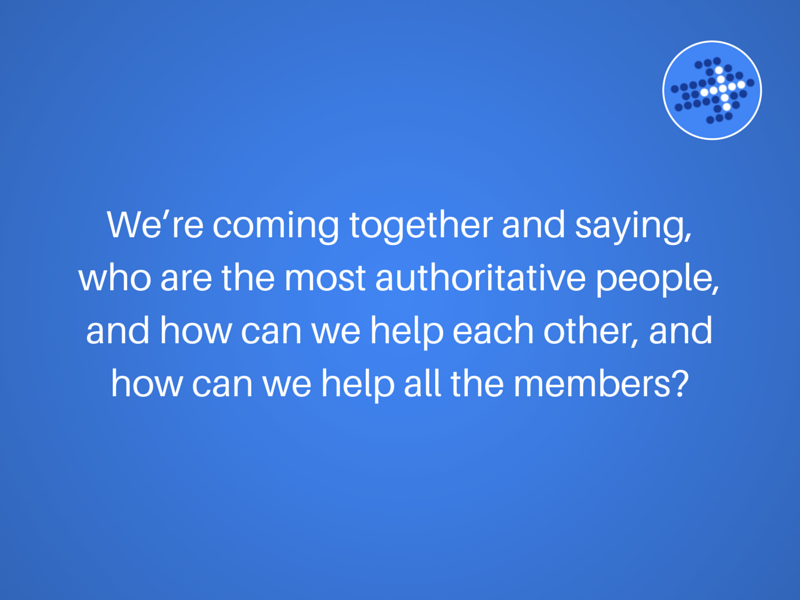
So that’s really what we’re doing. That’s a community-based business. And I believe that there will be many more that are going to emerge, because I really think that we need different business models on this planet that allow people to do what they love and to come together in a way that has a structure, but enables them to show their strengths to the community and feel part of something.
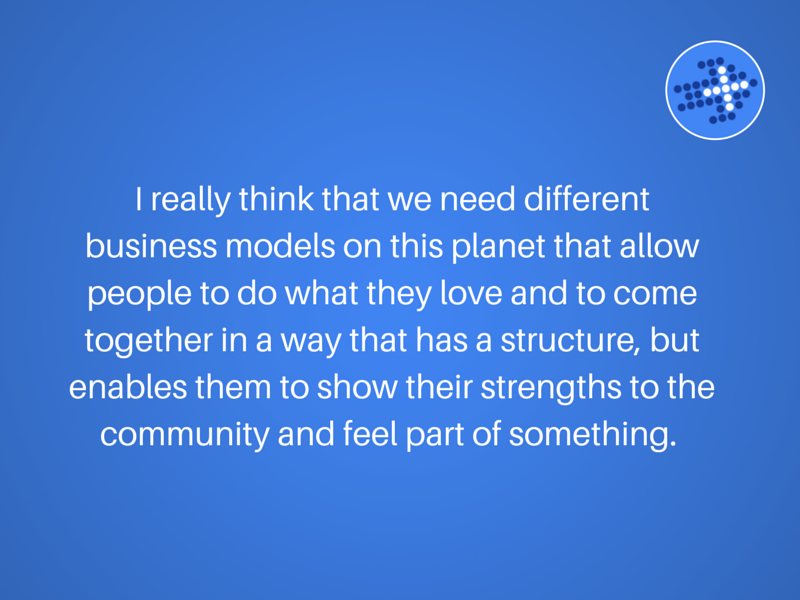
[end of transcript]